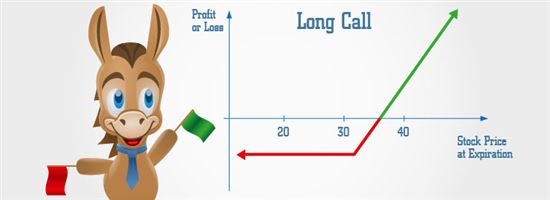Long Call Option
You think a stock's price will increase, so you want in on that trade. What if you didn't have to fork over the entire amount of capital? What if you could pay a much smaller premium and still make money?
It sounds too good to be true and it just might be. It's called a long call. It works in the right situations. In the wrong situation, you stand to lose your entire investment.
Is the long call right for you? Continue reading to learn just what it is and what you stand to win/lose with this trade.
What Is a Long Call?
 |
| © CreditDonkey |
When you use the long call strategy, you buy the right to buy a stock at the strike price. You don't have to buy the stock, though. Investors often use this as an alternative to buying the stock outright. Either they don't have the capital or they want to wait. You can think of it like a "rain check." When you have a rain check, you can buy the product at the specified price. But, you don't have to buy the product. The same is true for the stock.
The Basic Benefit
The long call strategy allows you to take advantage of the stock's potential to increase without the downside risk. Here's an example of buying a stock and buying an option for the stock:
Stock: XYZ
Stock's market price: $50
Option Premium: $3
Strike Price: $52
Investor A invests directly in XYZ's stock. He buys 100 shares at $50/share. He instantly invests $5,000. If the stock increases to $58, Investor A makes $800.
If the stock price dropped to $46, though, Investor A would lose $400.
Investor B invests in the stock's options rather than buying the stock outright. He buys 1 long call contract for a $2 premium. The option has a strike price of $52. He instantly invests $200. If the stock's price does increase to $58, Investor B can buy the stock at $52. He instantly makes $600. But he invested $200 to make the purchase, so he walks away with $400.
If the stock price dropped to $46, though, Investor B would let the option expire worthless. In this case, he would lose his initial investment only. This means a loss of $200.
As you can see, you protect your downside, should your prediction not come true.
In short, long call options provide unlimited profit potential with limited risk. This doesn't mean there is no risk. You still risk your initial investment. But the sky is the limit when it comes to the profits. There is no cap on how high the stock price can go.
Who Buys Long Calls?
An investor who feels bullish about a stock buys long calls. In other words, the investor believes the stock price will increase.
This investor wants to control 100 shares without giving up the capital necessary to buy it. However, he also believes the stock price will increase enough to cover his premium and make money.
For example, buying a $50 call for a $3 premium means you'd want the stock to end up at $53 before expiration. At $53, you would break even and below $53, you'd suffer a loss of $300.
How Do You Close Out Long Calls?
Stock options don't last forever. They have an expiration date. It could be days, weeks, months, or even a year. There are numerous options for each call. The later the expiration date, the higher the premium charged in most cases. The longer expiration gives more time for your prediction to come true.
No matter the expiration, at some point, you'll have to close out the position if it's in the money. You'll do this in one of 2 ways:
- Exercise your right to buy the stock at the strike price
- Sell the option back into the market
If you exercise your right to buy the stock, you'll need the capital. Say, for example, you have a $50 call for which you paid a $3 premium. The stock price hits $55, so you are in the money. You exercise your right to buy the stock at $50. You'll need $5,000 to buy the stock.
Now you own the stock. You can keep it and see what happens. You can also sell it right away for the market price of $55. You'd make a profit of $500. But, you paid a premium of $300 for the call option. Your net profit is $200.
If you sell your call back into the market, you don't need any capital. Let's use the same example. You have a $50 call and you paid a $3 premium. It's near the expiration date and the stock price is at $55. Let's say you can sell the call back into the market for a $5 premium. You'd collect $500. You already paid a premium of $300, so your net profit is $200.
Should You Trade Out-of-the-Money Calls?
Out-of-the-money calls often trade for much lower premiums. It's for good reason, though. They have a much lower likelihood of being worth anything. Oftentimes, they expire worthless. The buyer loses out on the premium. The seller gains the premium. No stocks exchange hands.
So why would you want to trade an option that is out-of-the-money? You gain much more leverage when an out-of-the-money option ends well. OTM options usually trade for much lower premiums as well. This tempts investors to buy more than 1 option. Again, if it expires in-the-money, you stand to make significant gains. But, if the stock price doesn't increase enough to overcome the predictions, you lose your entire investment.
Whether you should or shouldn't buy OTM calls depends on your risk tolerance. You should also see how it fits into your overall investment strategy. In other words, don't put all your eggs in one basket. An OTM option isn't likely to make you money, so consider it a bonus if it does.
Bottom Line
You may gain some significant leverage when you buy options. But buyer beware. Don't overdo it. Even though you can buy options to control many more shares, it's not guaranteed profit. Keep it simple - only purchase options contracts that equal the number of shares you would normally purchase. You may also want to stick to in-the-money calls at first.
Research and support from your broker are the key to successful options trading. You'll purchase the right calls and hopefully walk away with a profit in the end.
Write to Kim P at feedback@creditdonkey.com. Follow us on Twitter and Facebook for our latest posts.
|
|
|


